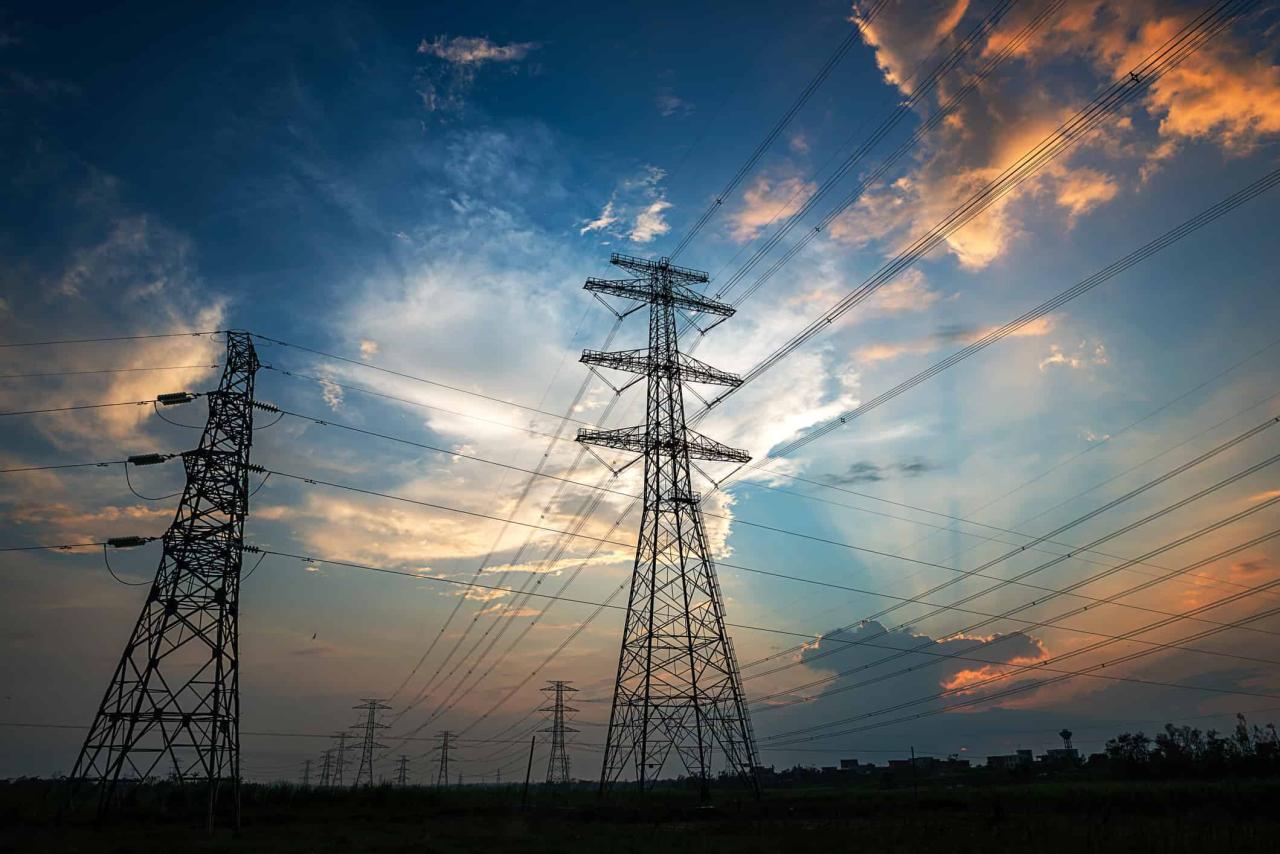
Big electrical companies are at the forefront of shaping the global energy landscape, navigating a complex interplay of technological advancements, environmental concerns, and evolving consumer demands. From powering our homes and businesses to driving innovation in renewable energy, these companies play a crucial role in shaping the future of electricity.
This industry is characterized by its dynamic nature, with major players constantly vying for market dominance through strategic acquisitions, research and development investments, and the adoption of cutting-edge technologies. As the world transitions towards a more sustainable future, big electrical companies are faced with the challenge of balancing their need for profitability with the need to reduce their environmental impact and contribute to a more equitable society.
Industry Overview
The global electrical industry is a vast and dynamic sector, encompassing the generation, transmission, distribution, and consumption of electricity. It plays a crucial role in supporting economic growth, social development, and technological advancements. The industry is characterized by significant investments, technological innovation, and evolving regulatory frameworks.
Major Players and Market Trends
The electrical industry is dominated by a few large multinational companies, including Siemens, General Electric, ABB, Schneider Electric, and Toshiba. These companies compete globally, offering a wide range of products and services across the entire value chain. The industry is also home to numerous smaller companies specializing in niche areas, such as renewable energy, smart grids, and electric vehicle charging infrastructure.
The electrical industry is witnessing several significant trends, including:
- Growth in Renewable Energy: The increasing adoption of renewable energy sources, such as solar, wind, and hydro power, is driving significant growth in the electrical industry. This is due to concerns about climate change, rising energy prices, and government incentives promoting renewable energy.
- Smart Grid Technologies: Smart grid technologies are transforming the way electricity is generated, transmitted, and distributed. These technologies enable real-time monitoring, control, and optimization of the electrical grid, improving efficiency and reliability.
- Electrification of Transportation: The shift towards electric vehicles (EVs) is creating new opportunities for electrical companies, as they play a crucial role in developing and deploying EV charging infrastructure.
- Digitalization and Automation: The increasing adoption of digital technologies, such as automation, artificial intelligence (AI), and the Internet of Things (IoT), is transforming the electrical industry. These technologies are improving efficiency, reducing costs, and enabling new business models.
Competitive Landscape, Big electrical companies
Competition in the electrical industry is intense, driven by factors such as:
- Technological Advancements: Rapid technological advancements are constantly creating new opportunities and challenges for companies in the electrical industry. Companies must invest heavily in research and development to stay ahead of the competition.
- Global Market Expansion: The electrical industry is becoming increasingly globalized, with companies expanding their operations to new markets. This is leading to increased competition from both domestic and international players.
- Regulatory Changes: Governments around the world are implementing new regulations to promote energy efficiency, renewable energy, and grid security. These regulations can create both opportunities and challenges for electrical companies.
- Customer Expectations: Customers are demanding more reliable, efficient, and sustainable electrical solutions. This is putting pressure on companies to innovate and offer products and services that meet these expectations.
Role of Technology
Technology is playing a transformative role in the electrical industry, driving innovation and shaping the future of the sector. Key technological trends include:
- Automation: Automation is being used to improve efficiency and reduce costs in various aspects of the electrical industry, from manufacturing to grid operations. For example, robots are being used to assemble electrical components, while AI-powered systems are being used to monitor and control power grids.
- Artificial Intelligence: AI is being used to analyze vast amounts of data from electrical grids, identify patterns, and optimize operations. This is leading to improved grid reliability, efficiency, and security.
- Renewable Energy Sources: Technological advancements in renewable energy sources, such as solar panels and wind turbines, are making them more affordable and efficient. This is driving the growth of renewable energy and reducing dependence on fossil fuels.
- Smart Grid Technologies: Smart grid technologies are enabling real-time monitoring, control, and optimization of the electrical grid, improving efficiency, reliability, and security. These technologies are also facilitating the integration of renewable energy sources into the grid.
Major Players and Their Impact

The global electrical industry is dominated by a handful of large, multinational corporations that have a significant impact on the industry’s direction and development. These companies are responsible for a large portion of the world’s electricity generation, transmission, and distribution, and their operations influence everything from the cost of energy to the adoption of new technologies.
Top 10 Global Electrical Companies
The top 10 global electrical companies, ranked by revenue, are:
- Siemens (Germany)
- General Electric (United States)
- Schneider Electric (France)
- ABB (Switzerland)
- Enel (Italy)
- Toshiba (Japan)
- Hitachi (Japan)
- Mitsubishi Electric (Japan)
- Legrand (France)
- Emerson Electric (United States)
These companies have a significant global presence, with operations in multiple continents. They are involved in a wide range of activities, including power generation, transmission and distribution, automation and control, and energy efficiency solutions.
Key Strategies Employed by Top Electrical Companies
The top electrical companies employ a range of strategies to maintain their market dominance. Some of the key strategies include:
- Innovation and Research & Development: These companies invest heavily in research and development to create new technologies and products that meet the evolving needs of the market. For example, Siemens has been a pioneer in the development of smart grids, which are designed to improve the efficiency and reliability of electricity distribution.
- Mergers and Acquisitions: Mergers and acquisitions are another key strategy employed by these companies to expand their market reach and gain access to new technologies and markets. For example, ABB’s acquisition of GE’s power business in 2020 significantly expanded its portfolio of power generation and transmission equipment.
- Global Expansion: These companies are constantly looking for opportunities to expand their operations into new markets. This includes investing in new manufacturing facilities, developing new partnerships, and acquiring local companies. For example, Schneider Electric has a strong presence in emerging markets such as China and India, where it is investing heavily in renewable energy solutions.
- Strategic Partnerships: These companies often collaborate with other companies to develop new technologies and solutions. For example, Siemens has partnered with several automotive companies to develop electric vehicle charging infrastructure.
Impact of Top Electrical Companies on the Global Electrical Industry
The top electrical companies have a profound impact on the global electrical industry. They play a critical role in:
- Innovation: These companies are responsible for many of the technological advancements that have transformed the electrical industry. They are constantly developing new technologies to improve the efficiency, reliability, and sustainability of electricity generation, transmission, and distribution.
- Job Creation: These companies are major employers, creating jobs in a wide range of fields, including engineering, manufacturing, and sales.
- Environmental Sustainability: These companies are increasingly focusing on developing sustainable solutions to address the challenges of climate change. They are investing in renewable energy technologies, energy efficiency solutions, and smart grids to reduce greenhouse gas emissions and promote sustainable energy consumption.
Challenges and Opportunities: Big Electrical Companies
The electrical industry, like any other, faces a dynamic landscape characterized by both challenges and opportunities. Big electrical companies must navigate these complexities to maintain their position and thrive in the future.
Regulatory Changes
Regulatory changes pose significant challenges for big electrical companies. These changes can affect various aspects of their operations, including product design, manufacturing processes, and market access. For example, the increasing emphasis on energy efficiency and renewable energy sources has led to stricter regulations for appliances and equipment, requiring companies to invest in research and development to meet these new standards. Additionally, changes in environmental regulations, such as those related to greenhouse gas emissions, can significantly impact the cost of production and distribution.
- Shifting Energy Landscape: The transition to renewable energy sources, such as solar and wind power, creates challenges for traditional electrical companies. They must adapt their business models to incorporate these new technologies and compete with emerging renewable energy providers. For example, some companies are investing in renewable energy projects or developing new technologies to integrate renewable energy sources into the grid.
- Cybersecurity Concerns: The increasing reliance on digital infrastructure in the electrical industry creates vulnerabilities to cyberattacks. Big electrical companies must invest in robust cybersecurity measures to protect their critical systems and data from potential threats.
Supply Chain Disruptions
Supply chain disruptions can have a significant impact on the electrical industry. These disruptions can be caused by various factors, such as natural disasters, political instability, and global trade tensions. For example, the COVID-19 pandemic exposed the fragility of global supply chains, leading to shortages of key components and raw materials. This highlights the importance of diversifying supply chains and developing strategies to mitigate disruptions.
- Global Trade Tensions: Trade wars and tariffs can disrupt supply chains and increase costs for electrical companies. For example, tariffs on imported components can make it more expensive for companies to manufacture their products.
- Natural Disasters: Natural disasters, such as earthquakes, hurricanes, and floods, can damage infrastructure and disrupt production. Companies must have contingency plans in place to minimize the impact of such events.
Competition from Emerging Markets
Emerging markets, particularly in Asia and Africa, are experiencing rapid growth in demand for electrical products and services. This presents both opportunities and challenges for big electrical companies. On the one hand, these markets offer significant growth potential. On the other hand, they also face intense competition from local and international players.
- Emerging Technologies: Companies in emerging markets are often at the forefront of innovation, developing new technologies and business models that can challenge established players. For example, Chinese companies have made significant advancements in areas such as electric vehicles and solar energy.
- Local Market Expertise: Local companies often have a better understanding of the specific needs and preferences of consumers in emerging markets. Big electrical companies must adapt their products and services to meet these local demands.
Opportunities for Growth and Expansion
Despite the challenges, the electrical industry also presents significant opportunities for growth and expansion. These opportunities are driven by factors such as technological advancements, increasing urbanization, and changing consumer preferences.
- Smart Grid Technologies: The development of smart grid technologies is creating new opportunities for electrical companies. Smart grids are more efficient and reliable than traditional grids, and they can facilitate the integration of renewable energy sources.
- Internet of Things (IoT): The Internet of Things (IoT) is revolutionizing the electrical industry by connecting devices and appliances to the internet. This allows for greater control and efficiency, and it creates new opportunities for data analytics and remote monitoring.
- Electric Vehicles: The growing popularity of electric vehicles (EVs) is creating demand for new products and services, such as charging infrastructure and battery storage systems. Electrical companies are well-positioned to capitalize on this trend.
- Emerging Markets: As mentioned earlier, emerging markets offer significant growth potential for electrical companies. These markets are experiencing rapid urbanization and industrialization, leading to increased demand for electricity and electrical products.
Environmental and Social Responsibility
The electricity industry plays a pivotal role in modern society, powering homes, businesses, and infrastructure. However, it also carries significant environmental and social responsibilities. Big electrical companies are increasingly under scrutiny for their impact on the planet and their contributions to a more equitable and sustainable future.
Environmental Impact
The environmental impact of big electrical companies is multifaceted and complex. Their operations, from power generation to transmission and distribution, can have both positive and negative consequences for the environment.
Carbon Footprint
A major environmental concern is the carbon footprint of electrical companies. Power generation, particularly from fossil fuels, is a significant contributor to greenhouse gas emissions. Coal-fired power plants, for instance, release large amounts of carbon dioxide, a major greenhouse gas responsible for climate change.
Resource Consumption
Electrical companies consume vast amounts of resources, including water, land, and raw materials. Power plants require significant water for cooling, and mining operations for fossil fuels and renewable energy resources can have substantial environmental impacts.
Waste Generation
The generation and disposal of waste are also significant environmental concerns. Power plants produce various types of waste, including fly ash, bottom ash, and scrubber sludge. The disposal of these wastes can pose environmental risks if not managed properly.
Social Responsibility Initiatives
Recognizing their social responsibilities, big electrical companies have undertaken various initiatives to address social and environmental concerns. These initiatives encompass a wide range of activities, from promoting diversity and inclusion to supporting local communities and engaging in ethical business practices.
Diversity and Inclusion
Promoting diversity and inclusion within the workplace is a key aspect of social responsibility. Big electrical companies are increasingly recognizing the importance of creating inclusive work environments that value and embrace diversity in terms of gender, race, ethnicity, sexual orientation, and other factors.
Community Engagement
Engaging with local communities is another crucial aspect of social responsibility. Big electrical companies are actively involved in community outreach programs, providing financial support to local organizations, and sponsoring community events.
Ethical Business Practices
Ethical business practices are essential for building trust and credibility with stakeholders. Big electrical companies are adopting ethical codes of conduct, promoting transparency in their operations, and ensuring compliance with environmental regulations.
Effectiveness of Initiatives
The effectiveness of these initiatives varies widely across different companies. Some companies have made significant progress in reducing their environmental impact and promoting social responsibility. Others have faced challenges in implementing these initiatives effectively.
Challenges and Opportunities
Big electrical companies face numerous challenges in enhancing their environmental and social performance. These challenges include:
- Balancing economic growth with environmental sustainability.
- Managing complex stakeholder expectations.
- Adapting to rapidly changing technologies and regulations.
Despite these challenges, there are significant opportunities for big electrical companies to enhance their environmental and social performance. These opportunities include:
- Investing in renewable energy sources.
- Improving energy efficiency.
- Adopting circular economy principles.
- Strengthening community partnerships.
- Promoting transparency and accountability.
Future Trends and Predictions

The electrical industry is undergoing a period of rapid transformation, driven by technological advancements, evolving consumer preferences, and growing environmental concerns. These trends are shaping the future of the industry, creating both opportunities and challenges for big electrical companies.
Impact of Technological Advancements
Technological advancements are playing a crucial role in shaping the future of the electrical industry. The development of new technologies, such as artificial intelligence (AI), the Internet of Things (IoT), and renewable energy sources, is creating new possibilities for energy generation, distribution, and consumption.
- Smart Grids: Smart grids are a key technological advancement that is transforming the electrical industry. Smart grids use advanced technologies, such as sensors, communication networks, and AI, to optimize energy generation, distribution, and consumption. This enables utilities to improve reliability, efficiency, and sustainability.
- Renewable Energy: The increasing adoption of renewable energy sources, such as solar, wind, and hydro power, is driving a shift towards a more sustainable energy future. Big electrical companies are investing heavily in renewable energy technologies, expanding their product offerings, and developing new business models.
- Electric Vehicles (EVs): The rapid growth of the electric vehicle market is creating new opportunities for big electrical companies. EVs require large amounts of electricity, driving demand for charging infrastructure and grid modernization.
Conclusion

The future of big electrical companies hinges on their ability to adapt to the changing tides of the industry. This includes embracing new technologies, forging strategic partnerships, and prioritizing sustainability initiatives. As the world becomes increasingly reliant on electricity, these companies will continue to play a vital role in shaping our energy future.
Answers to Common Questions
What are some of the biggest challenges faced by big electrical companies?
Big electrical companies face a variety of challenges, including regulatory changes, supply chain disruptions, competition from emerging markets, and the need to reduce their environmental impact.
How are big electrical companies contributing to a more sustainable future?
Many big electrical companies are investing in renewable energy sources, reducing their carbon footprint, and implementing sustainable practices across their operations.
What are some of the latest trends in the electrical industry?
Some of the latest trends in the electrical industry include the increasing adoption of smart grids, the growth of electric vehicles, and the development of new energy storage technologies.




